Master Time Management in IELTS Reading for Higher Band Scores
Securing a high band score in IELTS Reading extends beyond vocabulary and comprehension skills—strategic time management separates successful candidates from those who struggle. PREP unveils three battle-tested strategies for time management in IELTS Reading, complemented by five precision techniques that optimize your performance during the actual examination. These methods form the foundation for achieving band scores of 8.0 and beyond.
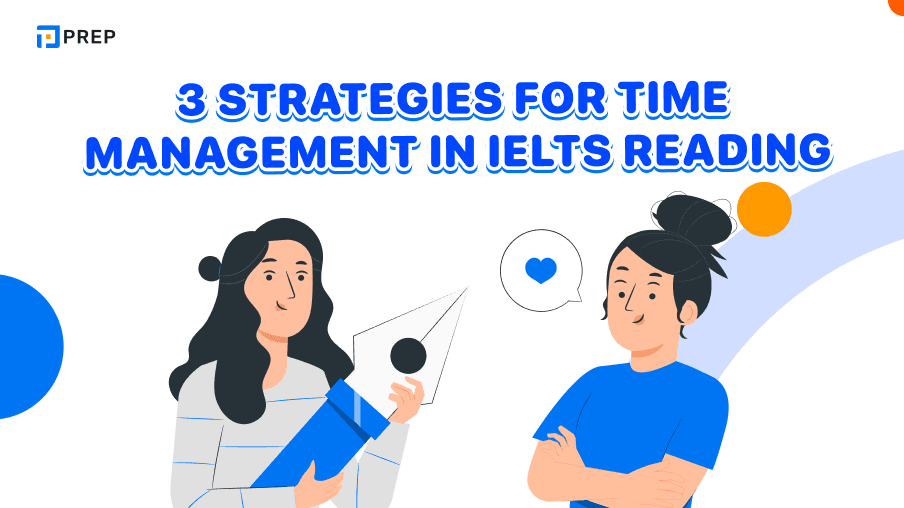
I. Time management in IELTS Reading
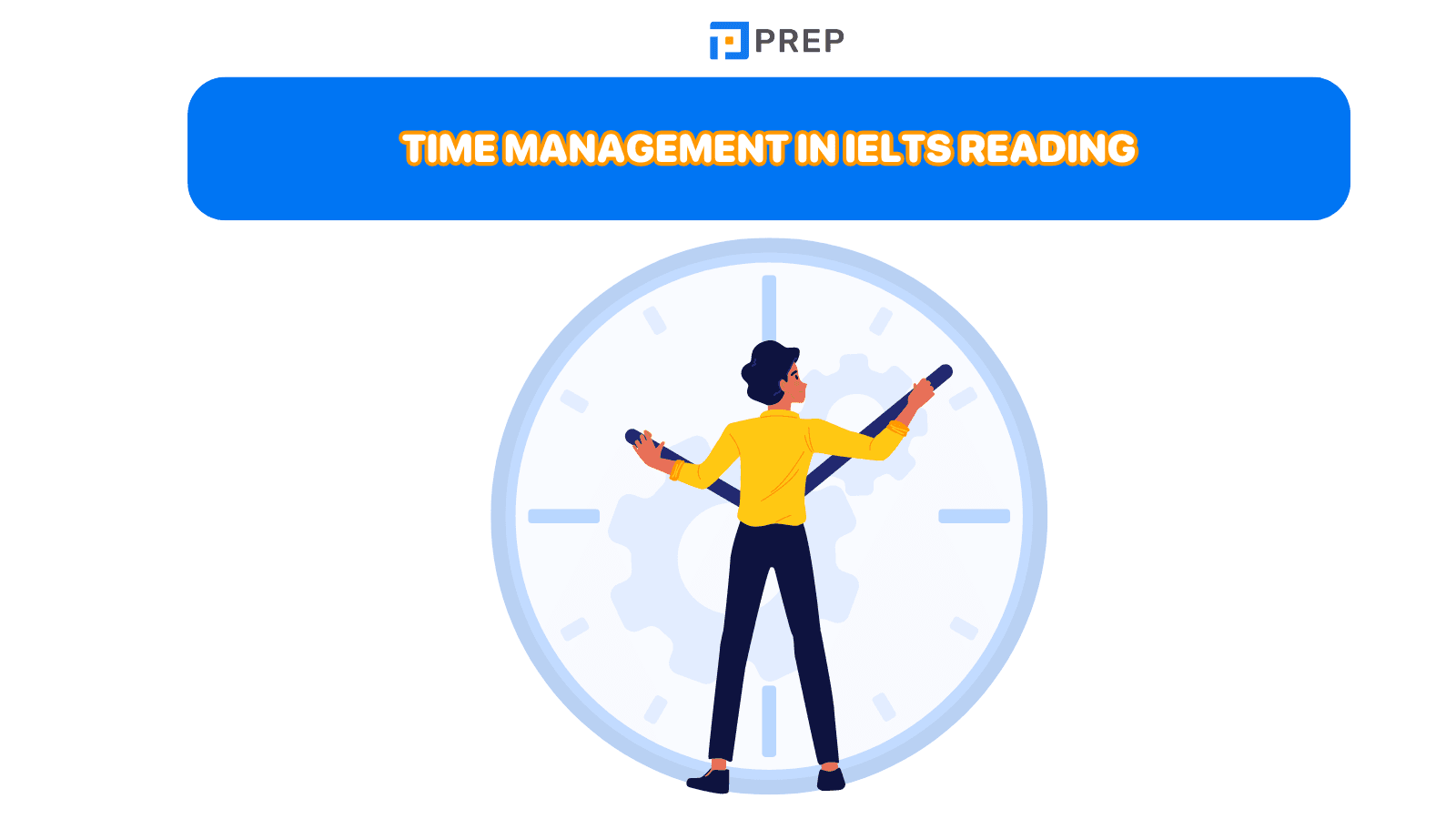
Both IELTS Academic and General Training formats impose an unforgiving 60-minute constraint. Within this narrow window, candidates must process three distinct reading passages while answering 40 comprehensive questions.
Strategic time allocation becomes your competitive advantage. The difference between achieving your target score and falling short often hinges on how effectively you distribute these precious 60 minutes across varying passage complexities.
II. Strategies for time management in IELTS Reading
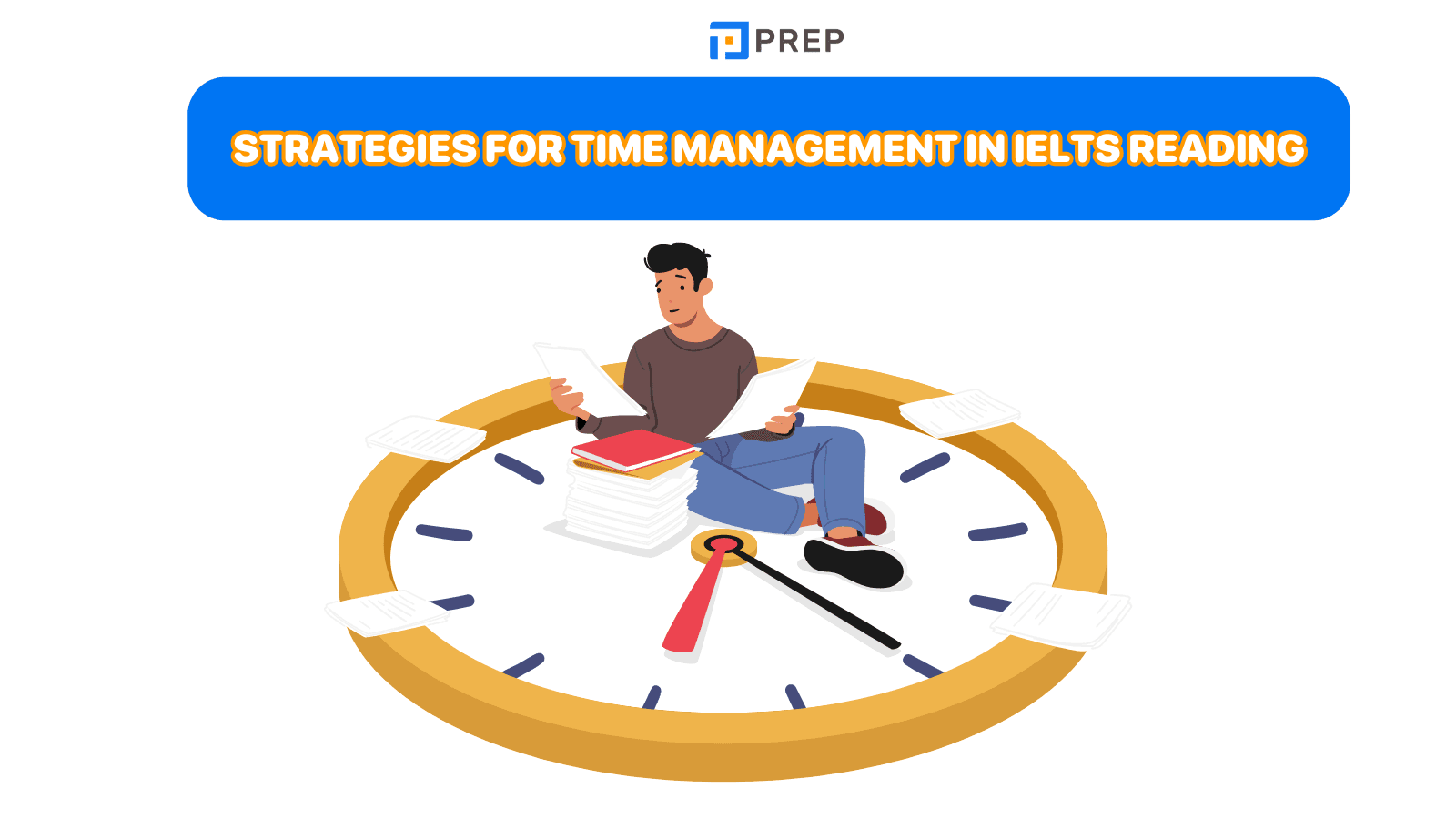
1. 15 - 20 - 25 Strategy
The first strategy for time management in IELTS Reading that PREP wants to introduce is the 15 - 20 - 25 strategy:
-
15 minutes for the easiest passage
-
20 minutes for the second easiest passage
-
25 minutes for the most difficult passage
This strategy aligns with natural test progression, where difficulty typically escalates from Task 1 through Task 3. The method works exceptionally well for candidates targeting band scores of 7.0 or higher, providing sufficient time to tackle complex question types that appear in later passages.
Strategic Application: IELTS Reading passages follow deliberate difficulty progression. Task 1 usually presents straightforward content with accessible vocabulary, while subsequent tasks introduce abstract concepts, complex sentence structures, and sophisticated question formats. The 15-20-25 allocation mirrors this progression, ensuring adequate time for intricate analysis when complexity peaks.
Individual Adaptation Required: Recent test-taker feedback reveals that Task 2 sometimes presents greater challenges than Task 3. Your personal reading strengths and weaknesses dictate optimal time distribution. Conduct a rapid 30-second overview of all three passages before beginning to assess their relative difficulty accurately.
2. 20 - 25 - 15 Strategy
The second strategy for time management in IELTS Reading that PREP wants to introduce is the 20 - 25 - 15 strategy:
-
20 minutes for the easiest passage
-
25 minutes for the slightly harder passage
-
15 minutes for the most difficult passage
This approach prioritizes guaranteed points over ambitious attempts at the most challenging content. Particularly effective for candidates targeting band scores between 5.5 and 6.5, this strategy recognizes that partial success on easier passages often yields higher overall scores than incomplete attempts across all three.
Tactical Advantage: By investing substantial time in manageable passages, you establish a solid scoring foundation before confronting the most demanding content. Even if time constraints prevent complete Task 3 completion, your secured points from earlier passages maintain overall performance standards.
Emergency Protocol: When time expires before Task 3 completion, apply intelligent guessing rather than leaving blanks. Statistical probability favors educated guesses over omitted responses.
3. The Flexibility Strategy: 1-3-2 Method
This non-sequential approach involves completing passages in order of personal strength rather than test sequence:
-
Phase 1: Complete your strongest passage type first
-
Phase 2: Tackle your second-strongest area
-
Phase 3: Address your most challenging passage type last
Strategic Benefits: This method maximizes confidence building while ensuring your strongest skills receive optimal attention when mental fatigue remains minimal. By securing points in areas of expertise early, you create psychological momentum that carries through more challenging sections.
III. Tips for effective time management in IELTS Reading
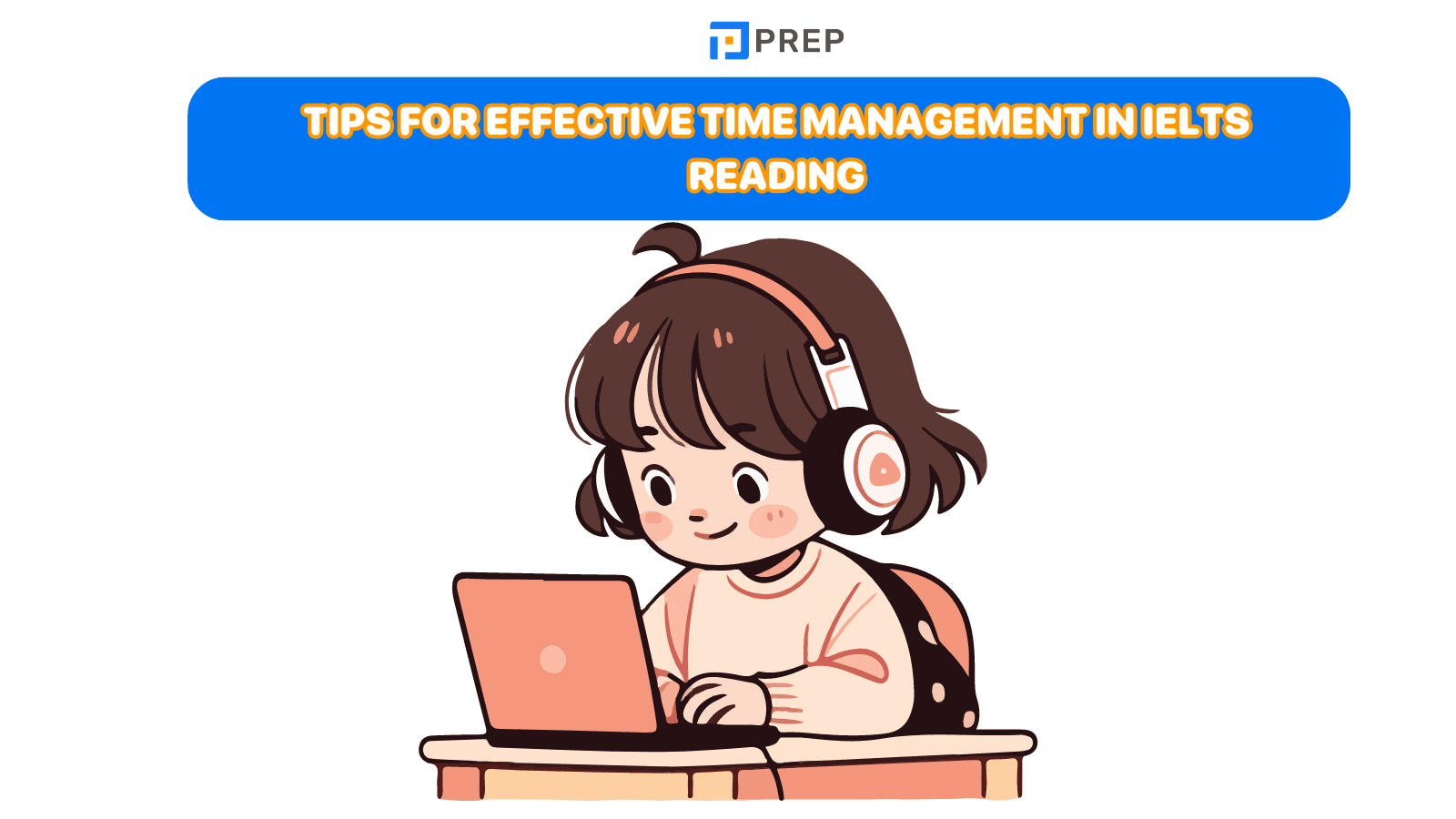
1. Tip 1: Preview the questions in the test
During the reading process, the human brain needs to actively work to form an overall picture of the information mentioned in the passage. You can help your brain avoid difficulties by quickly previewing the questions in the test beforehand.
The questions provide the most comprehensive information for test-takers in the reading passage. Mastering the questions is an advantage that helps test-takers imagine the possible content by visualizing them. However, don't rush to answer all the questions, just quickly skim through the content of each task, and then proceed to write down the answers immediately!
2. Tip 2: Read in order: Introduction ➡ Conclusion ➡ Body
Limit linear reading habits in favor of strategic information gathering:
-
Step 1: Read the introduction paragraph completely
-
Step 2: Jump to the conclusion paragraph
-
Step 3: Return to process body paragraphs systematically
This sequence provides comprehensive context before detailed analysis begins. Understanding the author's main argument and conclusions enables more efficient processing of supporting details and examples.
3. Tip 3: Don't read all the sentences in the passage
Master the art of selective reading by employing strategic skimming techniques. This involves rapid text scanning to identify main ideas, topic sentences, and structural elements without processing every word.
Application Focus: Target topic sentences, transitional phrases, and concluding statements within each paragraph. These elements contain the highest concentration of testable information while requiring minimal processing time.
Efficiency Principle: Comprehensive reading consumes excessive time while often providing unnecessary detail. Skimming enables information extraction at optimal speed while maintaining accuracy on question responses.
4. Tip 4: Underline important information
After Skimming, test-takers proceed to use the Scanning technique.
-
Names and Organizations: Circle proper nouns immediately
-
Dates and Numbers: Underline temporal and quantitative references
-
Transition Words: Mark logical connectors and signal phrases
-
Key Concepts: Highlight specialized terminology and main ideas
Underlining important information not only helps you save a considerable amount of time but also allows you to multitask without wasting time searching or reading them again.
5. Tip 5: Allocate no more than 1 minute for each question
Maintain strict adherence to one-minute-per-question timing. This disciplined approach ensures complete test coverage while preventing time loss on individual challenging items.
Strategic Implementation: Monitor your progress at 20-minute intervals. After 20 minutes, you should complete approximately 13-14 questions. After 40 minutes, target 26-27 completed questions. This pacing maintains trajectory toward full completion.
Priority Management: Address straightforward questions immediately while marking difficult items for later review. This approach secures available points before investing time in complex problem-solving.
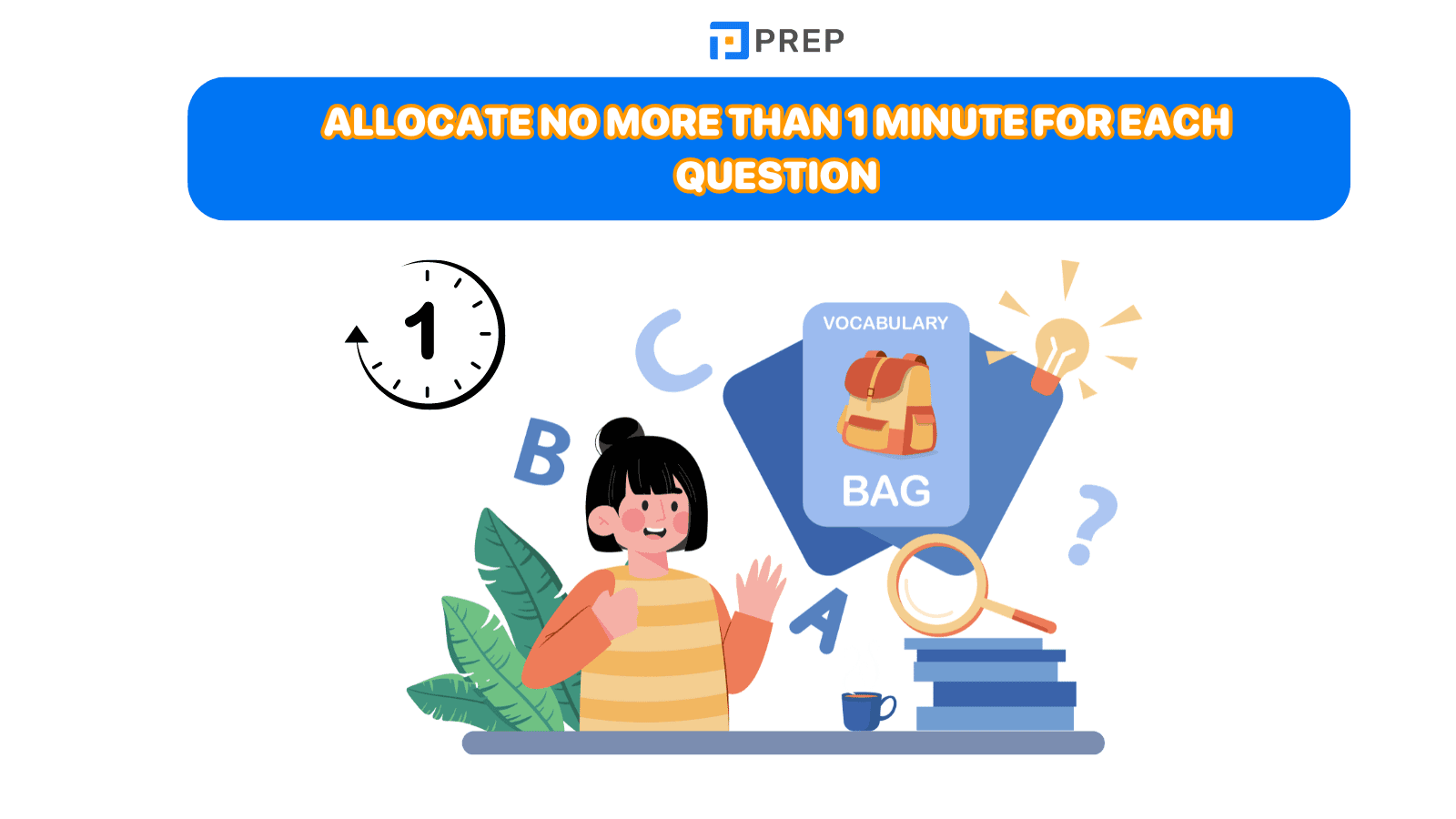
These time management strategies for IELTS Reading provide systematic frameworks for performance optimization under pressure. Success demands consistent practice with these techniques until they become automatic responses during actual testing conditions.
PREP's comprehensive approach combines strategic thinking with practical application, enabling candidates to achieve their target band scores through disciplined time management and strategic question analysis. Master these techniques through regular practice, and transform time constraints from obstacles into competitive advantages.

Hi I'm Chloe, and I am currently serving as an Product Content Administrator at Prep Education. With over five years of experience in independent online IELTS study and exam preparation, I am confident in my ability to support learners in achieving their highest possible scores.
Comment
Premium content
View allPersonalized roadmap
Most read












